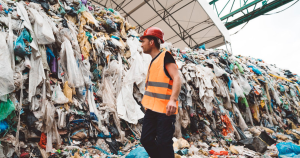As the billion-dollar fashion industry continues to soar, this is only worsening the wicked problems that lie within the fashion supply chains and the environment. These complex issues are rapidly intensifying as a result of our constant purchasing of bargains and must-have pieces.
As garment workers suffer severely in the sweatshops of the Global South and with textile factories continuing to pollute our Earth, the fashion industry will remain as one of the largest threats to our utmost daunting issue – climate change.
The fashion industry has caused a detrimental impact on our environment, as it has become the second-largest polluter in the world, second to the oil industry. This pollution is due to factories discarding textiles and toxic chemicals such as lead and mercury into the waterways of third world countries. The chemicals are extremely harmful towards the people in the surrounding areas and sea life as the toxins spread further around the globe as it reaches the oceans.
The industry is also the cause of many social wrongs that occur in the Global South as it puts countless garment workers in hazardous if not deadly situations. Infamous events such as the 2013 Rana Plaza factory collapse that took the lives of 1,134 garment workers in Bangladesh is a prime example of this as the building which was declared unsafe kept thousands of workers from safely exiting due to the deadlines enforced by household names.
Young women in the villages of Bangladesh are pushed into working for these garment industries due to our large carbon footprints. Our uncontrollable ways of consuming have affected their livelihoods due to the regular droughts and floods where they have no other option but turn to manufacture jobs in Dhaka for stability.
These workers of the Global South are also denied fundamental human working rights where they’re desperate to work overtime to receive more money for a living, as their paycheck is less than the minimum living wage. Majority of workers receive a gross minimum monthly salary of 3,000 Bangladeshi takas a month, which converts to just 49 Australian dollars and is far from the living wage to keep afloat and buy the bare necessities.
Along with more horrific and incomprehensible issues that occur along the supply chain, including that of sexual abuse and disregarded ongoing child labour, there is plenty of non-transparent occurrences happening behind closed doors.
 So if you’re want to help the planet and the garment workers intertwined in these perplexing issues, but you’re not sure where to start then here are some ideas to get you started.
So if you’re want to help the planet and the garment workers intertwined in these perplexing issues, but you’re not sure where to start then here are some ideas to get you started.
It’s all about closing the loop and fixing our torn and ripped garments rather than discarding of them straight to landfill. The loop is the lifecycle of a garment and its journey from the cradle to the grave where the best possible outcome is preserving these garments and passing them on.
To close the loop, this can include exchanging or swapping garments at selected stores such as SWOP in Brisbane City where the goal is to celebrate longevity in our fashion. Garments in excellent conditions are then exchanged for cash where they are then sold in the store for the next shopper to buy.
Other alternatives such as swopping or renting clothes with friends or at stores such as One Night Stand Boutique in Teneriffe is another excellent idea. Renting clothes offers the choice from a variety of styles and saves you from squeezing out the last of your pennies on something you’d only wear a handful of times.
While another ethical alternative involves finding second-hand garments which can be relatively easy, especially if you make your way around to Paddington. Here you will find the likes of Vinnies, The Red Queen Design, Retro Metro, Yesterday’s Thrift Shop and Ra RaSuperstar where there’s plenty of designs, cuts and colours to suit your style.
Though if you’re after a new item, then ethical stores are the way to go! Shops located in Fortitude Valley such as the Uncommon Store, Alice Nightingale and Practice Studio are some of Brisbane’s finest that provideconsumers with creative and sustainably produced goods.
In West End, you’ll find the likes of Nook, Open House Collective and Aster & Lilou. With selected stores such as Alice Nightingale, Aster & Lilou and Practice Studio you’ll be keen to know that they also provide reasonably priced workshops and alterations for customers looking to give their torn and worn-out garments an extended life.
You’ll be doing the Earth and fundamentally yourself a favour as you take the first step toward a more ethical lifestyle in support of these practices. There is a need to address these perplexing environmental and supply chain issues before they exacerbate further. With these stores, right at our doorsteps, sustainable fashion has never been more convenient.








